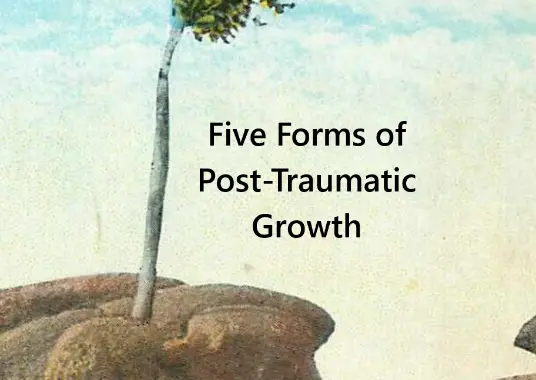Five Forms of Post-Traumatic Growth
Rain falls in everyone’s life. And sometimes trees, too.
Trauma is common. But so, too, is post-traumatic growth! About half of people report moderate to high post-traumatic growth, which is exciting since reinvention is necessary.
I tried (and failed) to find the source of the five forms of post-traumatic growth in the literature. Still, regardless, I think it is interesting to discuss different aspects of post-traumatic growth and consider what you’ve experienced.
Five Dimensions of Post-traumatic Growth
The five dimensions of post-traumatic growth are:
- Greater personal strength
- Improvements in relationships with other people
- Greater appreciation of life
- New priorities and redefined personal values
- Spiritual evolution
Let’s look at them one by one.
Finding personal strength
Discovering strengths gained through difficult times is a process. While it may seem insurmountable, you have survived everything your past has thrown at you. Dig deep through the hard times and unleash skills you might never otherwise discover.
While discovering new strengths is important to personal growth, it takes effort to try new things. Trauma is a shove in the back pushing you on the train tracks, and it takes new skills to get yourself off before the express gets you. Finding personal strength is responding rather than reacting.
Forming deeper relationships
Generally, after a loss, we go within and look for support from others. After awakening to trauma, toxic people seem to pepper life with disagreeableness. Expect to lose 50% of people in your life as part of post-traumatic growth. This deepens remaining friendships.
Friendship is important; being more authentic and open can lead to closer ties. Improvement in relationships with others comes from authentic connection and unrelenting self-love.
Friendship is a work in progress. As an outsider my whole life (who finally understands why I felt that way), re-learning trust is a process. I am working on finding a way to meet and support others.
Gaining an appreciation of life
Shifting perspectives are expected. Even after betrayal, the sun will still rise tomorrow. Eventually, you might live more in the moment and notice things you missed before. Find Awe. Pay attention to what seems like an everyday gift. Find a way to reflect on the good things in your life, and dig deep to find gratitude; joy can be yours once again. Joy results from gratitude, so post-traumatic growth is a daily gratitude practice.
One day, we all be six feet under or tossed up into the wind. Appreciate life.
Discovering meaning in life
Post-traumatic growth is a spiritual awakening or something more mundane. There is meaning in daily living. The craft of living a life of purpose is meaningful enough. It is the joy of discovering the meaning of life. Meaning and purpose need rediscovering. Reality is a dream. Or close enough.
Help people in need. Or not. Discovering more meaning in life is a must after trauma.
Seeing new possibilities
Trauma often forces you to chart a new, unexpected course in life.
Re-discovery or re-invention is mandatory for post-traumatic growth. I gave myself a five-year plan to learn self-love and find new possibilities. Starting with self-acceptance, you see new possibilities as you better learn who you are, bringing you personal contentment.
Common manifestations of reported posttraumatic growth include a greater
appreciation of life and refined sense of priorities; strengthening of significant, close
relationships; recognition and elaboration of personal strengths; recognition of new
possibilities or a sense of purpose for one’s life; and spiritual development. (source)
Five Forms of Post-Traumatic Growth
The results of this meta-analytic review clearly support the hypothesis that optimism, social support, spirituality, acceptance coping, reappraisal coping, religious coping, and seeking support coping are associated with posttraumatic growth. Coping responses, especially positive reappraisal and religious coping, are more related to posttraumatic growth than optimism and social support. (source)
Since retiring, I have grown tremendously. I have lost weight, lost friends and contacts, found new passions and pursuits, and re-defined myself as a pseudo-physician.
I’m no longer in life’s scrum, so I’m much less reactive. There are just fewer annoying people in my life. What would you do if you had fewer annoying people in your life?
I need to look in the mirror and figure out what I am putting into the world. There is work to be done.
Post-traumatic growth has allowed me to recognize areas of improvement; I will never be done.
